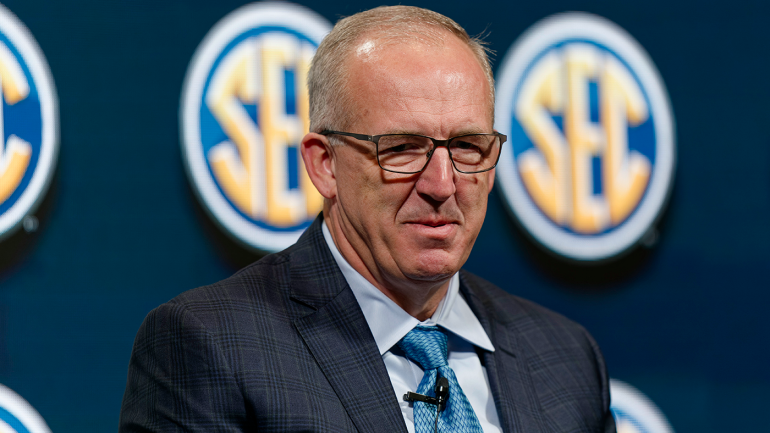
DESTIN, Fla. -- Greg Sankey sure sounded like he has a preference how many conference games the SEC should be playing beginning in 2024. What has become the league's latest great debate centers over whether to play eight or nine conference games as the SEC transitions to 16 teams and competes to earn bids in an expanded College Football Playoff a year from now.
A reasonable conclusion can be made that the SEC commissioner favors nine.
"The league at the forefront of college athletics does not stand still," Sankey told a small group of reporters Monday night ahead of the 2023 SEC spring meetings. "And this is a league at the forefront of college athletics. Whether change happens immediately is part of a careful consideration and a deep consideration."
League presidents could vote by Thursday on future scheduling models, but even that is not a certainty. The issue has become such a conundrum that Sankey said it may drag beyond this week. He sounded like he was ready to see the debate come to an end.
"I think we're poised to make a decision, but time is still a bit of an asset," he said.
Impacting the decision is how the SEC looks, plays and feels with those 16 teams following the addition of Texas and Oklahoma in 2024. Impacting the eight-or-nine decision is how an extra game would affect bowl eligibility and the SEC's place in the expanded 12-team playoff.
Discussions are far from finalized on how revenue would be distributed or how much CFP access the SEC might risk by altering its schedule. The league's iron grip on football could be impacted by the simple scheduling decision involving one additional league game per team.
The biggest issue at the moment is that the ninth game many in the SEC hope to add would reportedly not earn the league additional money. It is not expected that ESPN, which holds the entirety of the league's media rights starting in 2024, will commit to paying any additional money if the SEC added a ninth conference contest, Sports Illustrated reported Monday.
While the Longhorns and Sooners will receive pro rata (equal) value as any other SEC program would for its media rights, the per-school payout is not presently set to increase despite their addition to the league.
In other words, nearly two years after Texas and Oklahoma agreed to leave the Big 12 for the SEC, it does not appear as if the conference will be paid an extra dime.
Sankey, however, pushed back on that assertion that revenues are remaining flat.
"It's not precise to what we really have," he said. "A lot of people speculate about numbers and contractual provisions. We're going to do well. We're going to do well with 16 [teams]. … I tend to shift money from the centerpiece on a regular basis. There is precise language that provides benefits to us."
In fact, the commissioner pulled a card out of his wallet that reads, "Money follows. It doesn't lead." He called it, "the principle of my existence."
"When all you do is chase money, you make really bad decisions," the commissioner said. "That's my feeling. I'm watching that in college sports right now."
He went on to mention an NIL deal seemingly gone bad at BYU.
Despite these potential revenue hiccups, the SEC will be making the second-most annual revenue of any conference behind only the Big Ten. The SEC's exclusive deal with ESPN will pay each of the 16 teams a reported $60 million annually in media rights. To "tease" the notion of more revenue, Sankey suggested media check the league's tax returns in January 2026.
"If it was simply money, the Yankees would have even more championships," Sankey said.
For now, the scheduling vote is hard to call. With nine games, SEC teams would be playing three permanent rivals and six rotating opponents. With eight games, there would only be one permanent rival and seven rotating opponents given the league's long-held divisions will be going away no matter the overall number of games played. SEC teams currently play the six teams in their respective divisions, a permanent cross-division rival and a rotating cross-division opponent. That format has allowed many long-term rivalries to be played annually.
The agendas for the new scheduling format, whatever it may be, vary from one program to another. The likes of Vanderbilt have to worry about bowl eligibility. Alabama, Georgia and others have to worry about how their national championship chase will be impacted. (Sankey said conference metrics have shown there is little impact in bowl eligibility between playing eight or nine games.)
Some believe not to change (too much) what has long worked given the SEC has won 13 of the last 16 national championships. Amid of the unknown immediate impact of playing an extra league game, the SEC may settle on playing eight league games -- at least for one more year in 2024, according to SI.
The vote will require a simple majority of the 14 current schools.
But as one SEC athletic director warned, it would be unwise to speculate.
"We haven't even met yet," he said.
On the schedule issue, Sankey may not have a vote, but he does have lobbying power in the room. There have been contentious votes before in the SEC. Intraconference transfers was a huge discussion before the presidents voted 8-6 in favor years ago. Sankey was personally against allowing alcohol in stadiums, but beer and wine were approved in 2019.
Sankey said a 7-7 tie on scheduling models would momentarily "defeat the motion." However, it could be reintroduced in the same meeting where the issue could be "reconsidered." Texas and Oklahoma will be present do not have a vote as they are not official league members until July 1, 2024.
The process is so official the SEC uses Robert's Rules of Order used by NCAA committees.
Before retiring for the evening, Sankey made a case for eight games, if only to be fair to the discussion: balanced scheduled (four home, four away), familiarity, etc. Among the Power Five conferences, the Big Ten, Big 12 and Pac-12 all play nine conference games with the ACC the only other still playing eight.
"You're going to have a debate," Sankey concluded. "You're going to have people whisper in your ear. Whether it's true or not, I don't know. We'll have a press statement. Then we're going to work to schedule football games. Then we're going to play football games and life will go on."





















